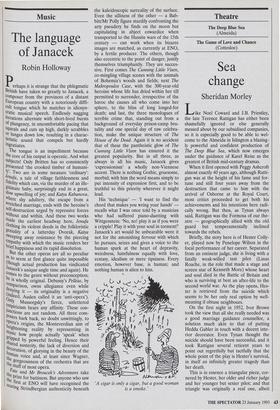Music
The language of Janacek
Robin Holloway
Perhaps it is strange that the phlegmatic British have taken so greatly to Janacek, a composer from the provinces of a distant European country with a notoriously diffi- cult tongue which he matches in idiosyn- static musical speech. Endlessly nagging Iterations alternate with short-lived bursts of Plangency, in uncomfortable pacing that squeals and cuts up high, darkly scrabbles or lunges down low, resulting in a charac- teristic sound that compels but hardly ingratiates.
The tongue is an impediment because the core of his output is operatic. And what subjects! Only Britten has so consistently Presented 'the crooked timber of humani- ty. Two are in some measure 'ordinary': Jenufa, a tale of village faithlessness and fidelity which can, via the murder of an ille- gitimate baby, surprisingly end in a great, slow upwelling of joy; and Katya Kabanova, Where shy adultery, the escape from a Wretched marriage, ends with the heroine's self-destruction urged by repressive forces Without and within. And these two works Made the earliest headway here, Jenufa Clothing its violent deeds in the folkloristic geniality of a latterday Dvorak, Katya sweeping away resistance by the piercing Leal.pathy with which the music renders her erief happiness and its rapid dissolution. But the other operas are all so peculiar as to seem at first glance quite impossible .t11°11gh actual production has vindicated atlacek's unique angle time and again). He :!3111es to the genre without preconception; "e Is wholly original. Debussy's Pelleas, by ,e13raparison, owns allegiance even while .enYing it — its originality is a negative lindeed, Auden called it an `anti-opera'). C)nly Mussorgsky's fierce, unlettered l:dricism bears any affinity. These con- Junctions are not random. All three com- Posers hark back, no doubt unwittingly, to (,)13.era's origins, the Monteverdian aim of aeightening reality by representing in Music how people actually 'speak' when Tpped by powerful feeling. Hence their ..nared austerity, the lack of diversion and Luecoration, of glorying in the beauty of the 11!ltrian voice and, at least since Wagner, tIfie le gorgeousness of the orchestra that are stuff of most opera. %Pare and Mr Broucek's Adventures take the Prize for battiness. But anyone who saw see first at ENO will have recognised the anng Strindbergian authenticity beneath the kaleidoscopic surreality of the surface. Even the silliness of the other — a Bab- bitt/Mr Polly figure sturdily confronting the arty pseudery he finds on the moon but capitulating in abject cowardice when transported to the Hussite wars of the 15th century — can work when its bizarre images are matched, as currently at ENO, by a fertile producer. The others, though also eccentric to the point of danger, justify themselves triumphantly. They are succes- sive. First comes The Cunning Little Vixen, co-mingling village scenes with the animals of Bohemia's woods and fields; next The Makropoulos Case, with the 300-year-old heroine whose life has dried within her till permitted to surrender, irrespective of the havoc she causes all who come into her sphere, to the bliss of long longed-for death; and last, the three monologues of terrible crime that, standing out from a background of everyday prison-camp bru- tality and one special day of raw celebra- tion, make the unique structure of The House of the Dead. Again it is no accident that of these the pantheistic glow of The Cunning Little Vixen has ensured it the greatest popularity. But in all three, as always in all his music, Janacek gives 'expressionism' a wholly non-Viennese accent. There is nothing Gothic, gruesome, morbid; with him the word means simply to put intensity of expression first, and to be truthful to this priority wherever it might lead.
His `technique' — 'I want to find the chord that makes you wring your hands' — recalls what I was once told by a musician who had suffered piano-duetting with Wittgenstein: 'No, no! play it as if you were a cripple! Play it with your soul in torment!' Janacek's art would be unbearable were it not for the astonishing fervour with which he pursues, seizes and gives a voice to the human spark at the heart of depravity, weirdness, hatefulness equally with love, ecstasy, idealism or mere tipsiness. Every emotion, however base, is human; and nothing human is alien to him.
'A cigar is only a cigar, but a good woman is a smoke.'


























































 Previous page
Previous page